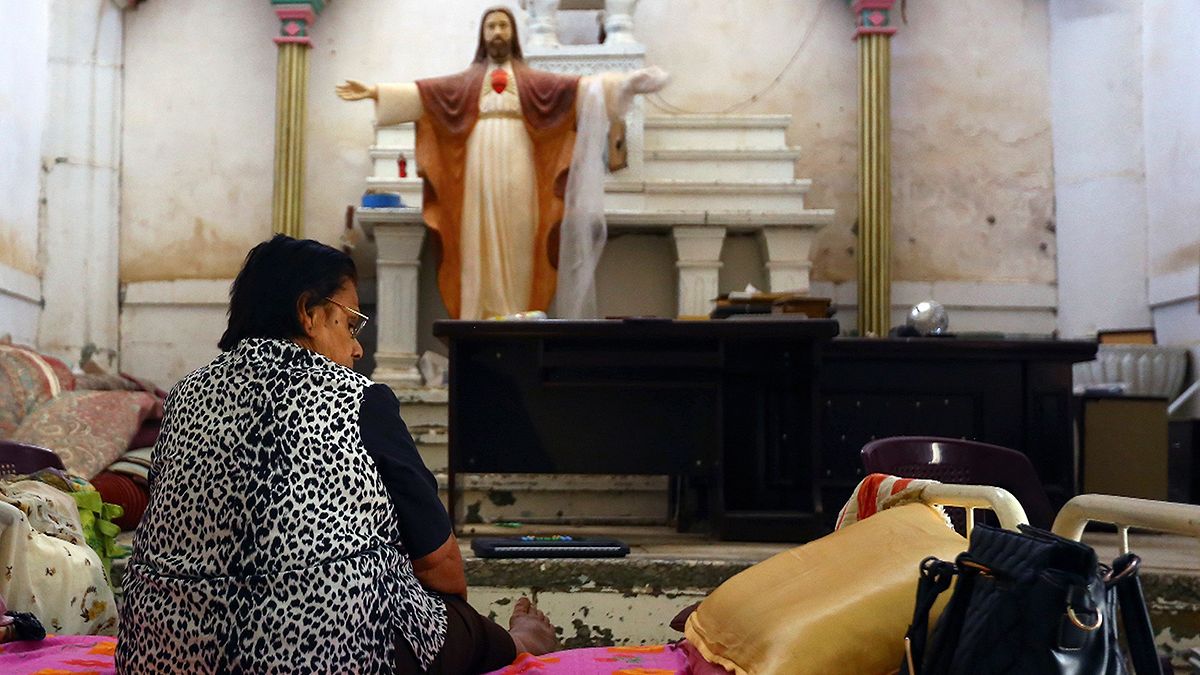Over the weekend, while the world’s gaze was on Gaza and Syria, the situation of Christians in northern Iraq took a sharp turn for the worse, with thousands forced to flee their homes. The situation is so dire that a social media campaign has been launched to try to reclaim the very symbol of persecution against these Christians and to try and raise awareness about their fate.
With a weekend ultimatum to either convert to Islam, submit to their radical rule and pay a religious levy, or face death by the sword, hardline Sunni militants of the Islamic State [IS] have been consolidating their control, driving Christians out of the city of Mosul. Of those who fled, some were robbed at gunpoint by Islamists on the road leaving the city.
Christians in Mosul once formed a community numbered in the tens of thousands set up in the region since the earliest of Christianity.
The local clergy was attacked as well. On Monday, militants took over the fourth century Saint Behnam monastery 30 km southeast of Mosul, forcing a monk and his assistant to leave, according to reports.
Internally Displaced People (IDP) in Iraq
- There are 1,200,000 Internally Displaced persons (IDPs) in Iraq
- This includes 500,000 displaced from fighting in Anbar province since January (before the most recent fighting in Mosul)
- The IDPs are scattered in numerous locations around the country. Some estimates from particular localities include: 100,000 thousand in Erbil. 200,000 in Duhouk, 97,000 in Ninewa and 25,000 IDPs in Sulaymanieh
- Christians are fleeing to all parts of the Kurdistan region of Iraq, including the governorates of Erbil, Duhok and Sulymaniah.
- Christians are not necessarily staying in camps – like most IDPs they stay outside of camps staying with host families, collective shelters like schools, hotel rooms etc.
- UNHCR protection officers estimate there are 1,000 Christian families (about 6,000 people) who have fled to the city of Erbil from Mosul since fighting broke out there in early June
- In addition, over the past weekend alone UNHCR estimates that more than 500 Christian families crossed the border into the Duhok governate in the Kurdistan Region of Iraq to escape the fighting. (3,000 people)
Source: UNHCR
In Mosul, IS militants marked with a spray-painted ن (the Arabic letter for “N”) all Christian property to be seized after the ultimatum. “N”, or ن, is the first letter of the Arabic word for Christian, “Nasrani” or Nazarene.
The local UN mission told Reuters 400 uprooted families arrived on Sunday morning in two cities in northern Iraq’s autonomous Kurdish enclave. Another 700 families were expected in Arbil, barely 50 miles (80 km) from Mosul. People of other faiths are leaving as well. A UNHCR spokesperson told euronews by email that, because ISIS’s actions are only a few weeks old, “there are probably many Iraqi refugees in neighbouring countries [fleeing IS activities] that are yet to approach UNHCR for registration or if they have they might still be waiting for an appointment(…) so it might be too early at this stage to have an accurate picture.”
Condemnations but no international response
Louis Raphael Sako, the Chaldean Catholic Patriarch and head of Iraq’s largest church, said on Sunday that the Islamic State militants were worse than Mongol leader Genghis Khan and his grandson Hulagu who ransacked medieval Baghdad in 1258.
One of Zako’s deputies, Bishop Shlemon Wardooni, called for an international response. “The world must act, speak out, consider human rights,” he said, adding that the Iraqi state was weak and divided and Muslim leaders had remained silent.
“We haven’t heard from clerics from all sects or from the government,” he told Reuters on Sunday. “The Christians are sacrificed for Iraq.”
Iraqi Prime Minister Nuri al-Maliki condemned the treatment of Mosul’s Christians, saying it showed “the extreme criminality and terrorist nature of [IS]” and UN Secretary General Ban said IS’ actions were akin to “a crime against humanity.” Pope Francis, in his weekly public prayers on Sunday, said: “I learned with great concern the news that came from the Christian communities in Mosul (…) Today they are persecuted. Our brothers are persecuted. They’ve been driven away. They must leave their homes without being able to take anything with them.”
A symbol of persecution becomes a cry for help
However, despite these strong-worded statements, the international community has so far been immobile .
Online, frustration over the world’s inaction have led to a social media campaign to raise awareness about the fate of Mosul’s Christians. Users, for the most part Christians and Catholics, are changing their profile pictures on Facebook and Twitter to a pictures of the letter ن, the very letter infamously branding their Iraqi co-religionists, and turning it into a symbol of support.
Many twitter users changing profile pic to the letter 'N' for #Nazarene - solidarity w/ Christians of #Mosul#ISISpic.twitter.com/9zyLOUAJg1
— Clarion Project (@clarionproject) 22 Juillet 2014
On Twitter, hashtags such as #WeAreN, #IamNasrani and #ن serve to share news and pictures, send 140-characters-long prayers, and announce time and place for support demonstrations in Western countries.
Pray for our brothers and sisters in Christ in the Middle East. They could use our help, especially in Iraq, Syria, and the Holy Land. #ن
— Connor Keef (@connorkeef) 22 Juillet 2014
#WeAreN Thisistheletter ISIS painted on homes, showing where Christianslive sotheycould drivethem outof Mosul. I am N pic.twitter.com/kRLluf0OXw
— Kathryn England (@KathrynEngland) 22 Juillet 2014
The first reported instance of the reclaimed use of the letter actually took place during a church service in east Baghdad on Sunday, led by Zako. According to reports, about 200 Muslims had joined in solidarity, many holding leaflets stating “I am Iraqi, I am Christian.” Other marked themselves with the letter ن.
If the IS launches an offensive and takes control of the Iraqi capital, such a show of solidarity would then probably be impossible. Offensive or not, the troubles of Iraq’s Christians are far from over.
